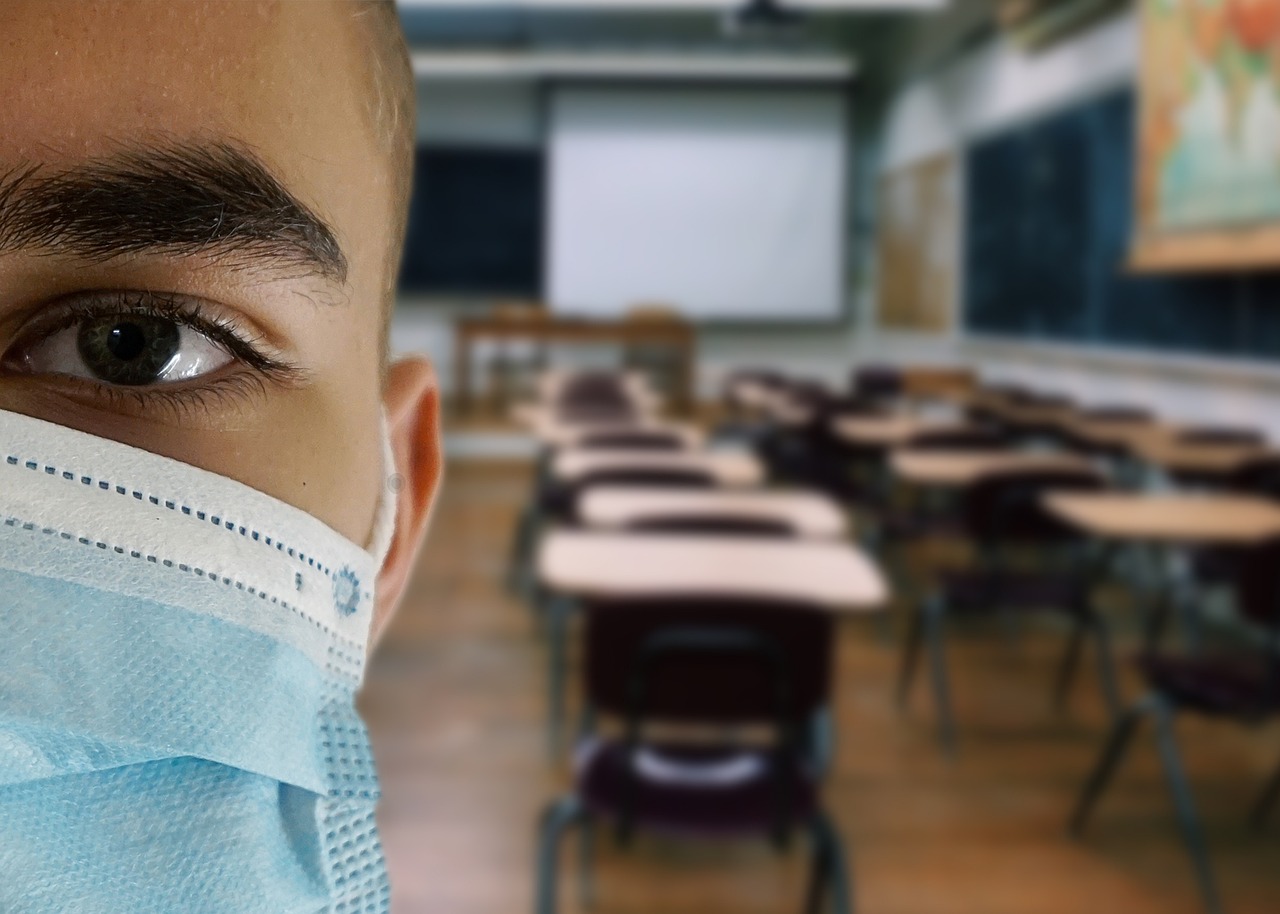School and Pandemic – in Italy and Germany
by Safaa Sabi (2005) Liceo Sesto Properzio, Assisi/Italy on 2023-05-29

The following article was written as part of the trait d`union online workshop “The fight against discrimination and the discussion on how to” between editors from Liceo Sesto Properzio di Assisi/Italy and Gisela-Gymnasium Munich/Germany in March 2022.
We would like to thank Alexandra Koch and pixabay for the use of the photo.
School and Pandemic – in Italy and Germany
The Results of our Teamwork
My group and I focused on a topic that has dramatically affected today`s youth and also our school systems: the pandemic. In our first brainstorming session we spoke about some important issues linked to the pandemic, which have affected adolescents seriously. They are: the increase of depression and suicidal thoughts and other illnesses due to isolation, the pressure caused by home schooling which has had repercussions on school attendance and has led to an increase in drop-outs. Finally, we analyzed the new addictions, such as alcohol, smoking and drugs, which are seen by young people as means to escape from the new reality created by this global emergency. Our main aim was talking about how the pandemic had influenced the school system and the different age groups in Italy and Germany.
The pandemic did not only cause the closure of schools, it also reduced the opportunities for children and young people to learn in other contexts, socializing with peers and adults outside the family environment. The effects, therefore, need to be assessed as a whole and are only partly ascribable to the restrictions imposed on school attendance. Unfortunately, there is still no evidence on how the pandemic has affected the development of skills such as the ability to cooperate with others, solve complex problems or creativity.
Another problem is early school leaving. All over the world, the difficulties faced by families have pushed many children with socio-economically disadvantaged situations, to drop out of school. Schools, a major reference point in the lives of children and adolescents, have tried to cope with the urgency, but it is undeniable that the pandemic crisis has also struck a severe blow to educational institutions.
Adolescents are said to be in a very fragile state, sinking into bewilderment because of bad marks or even minor difficulties. Some of them seem to lack the inner strength to deal with life`s obstacles. This is the main consequence of the pandemic that has shaken schools,
The main cause of depression among children is due to the lack of social relations during the Covid emergency. A lack given not only by remote learning, but also by the absence of extracurricular activities and by the obvious limitations in travelling. Even before the pandemic teenagers were experiencing an increase in psychological problems, such as anxiety and depression, which got worse during the emergency. To that we have to add disparities based on race, ethnicity, and sex, economic, food, or housing insecurity that affected part of the population before and during the pandemic.
Our group also worked to try and find solutions that could be functional enough to be used in the different schools as a way to help the students:
● Providing early intervention and adequate mental health support to students may help young people bounce back, which can be done by scaling up mental health services in schools and health systems.
● School, in addition to exploiting the potential of the most advanced digital technologies, should propose new learning paradigms with continuous refresher courses for teachers including proposals for didactic and methodological innovation.
Other little solutions or activities that can be done individually to help the health of adolescents can be:
● Going for walks and trying to do more physical activities since during the Covid restrictions many people started suffering of a low self-esteem that could not be stimulated by sport or interaction
● Starting a new diet, since many teenagers ate too much junk food during the lockdown
● Asking teachers for help, as homeschooling was not the best teaching environment and many children lost their will of studying
* In our survey we decided to ask parents questions about this situation, since it also had an impact on them and their way of living with their children.
It was also a way to have a general idea of the general feelings and doubts of teenagers after two years of pandemic.
Scuola e pandemia – in Italia e in Germania
I risultati del nostro lavoro
Il mio gruppo ed io ci siamo concentrati su un argomento che ha colpito drammaticamente i giovani di oggi e anche i nostri sistemi scolastici: la pandemia. Nella prima sessione di brainstorming abbiamo parlato di alcune importanti questioni legate alla pandemia, che hanno colpito gravemente gli adolescenti. Si tratta dell`aumento della depressione, dei pensieri suicidi e di altre malattie dovute all`isolamento, della pressione causata dall`istruzione domiciliare che ha avuto ripercussioni sulla frequenza scolastica e ha portato a un aumento degli abbandoni. Infine, abbiamo analizzato le nuove dipendenze, come l`alcol, il fumo e le droghe, che sono viste dai giovani come mezzi per sfuggire alla nuova realtà creata da questa emergenza globale. Il nostro obiettivo principale era parlare di come la pandemia abbia influenzato il sistema scolastico e le diverse fasce d`età in Italia e in Germania.
La pandemia non ha causato solo la chiusura delle scuole, ma ha anche ridotto le opportunità per i bambini e i giovani di imparare in altri contesti, socializzando con coetanei e adulti al di fuori dell`ambiente familiare. Gli effetti, quindi, devono essere valutati nel loro complesso e sono solo in parte riconducibili alle restrizioni imposte alla frequenza scolastica. Purtroppo, non ci sono ancora prove su come la pandemia abbia influito sullo sviluppo di abilità come la capacità di cooperare con gli altri, di risolvere problemi complessi o la creatività.
Un altro problema è l`abbandono scolastico. In tutto il mondo, le difficoltà delle famiglie hanno spinto molti bambini in situazioni socio-economiche svantaggiate ad abbandonare la scuola. Le scuole, un punto di riferimento importante nella vita di bambini e adolescenti, hanno cercato di far fronte all`emergenza, ma è innegabile che la crisi pandemica abbia inferto un duro colpo anche alle istituzioni educative.
La principale causa di depressione tra i bambini è dovuta alla mancanza di relazioni sociali durante l`emergenza Covid. Una mancanza data non solo dall`apprendimento a distanza, ma anche dall`assenza di attività extrascolastiche e dalle ovvie limitazioni negli spostamenti. Già prima della pandemia gli adolescenti stavano sperimentando un aumento dei problemi psicologici, come ansia e depressione, che sono peggiorati durante l`emergenza. A questo dobbiamo aggiungere le disparità basate su razza, etnia e sesso, l`insicurezza economica, alimentare o abitativa che ha colpito parte della popolazione prima e durante la pandemia.
Il nostro gruppo ha anche lavorato per cercare di trovare soluzioni che potessero essere abbastanza funzionali da essere utilizzate nelle diverse scuole per aiutare gli studenti:
· Fornire un intervento precoce e un adeguato sostegno alla salute mentale degli studenti può aiutare i giovani a riprendersi, il che può essere fatto aumentando i servizi di salute mentale nelle scuole e nei sistemi sanitari.
· La scuola, oltre a sfruttare il potenziale delle tecnologie digitali più avanzate, dovrebbe proporre nuovi paradigmi di apprendimento con corsi di aggiornamento continui per gli insegnanti che includano proposte di innovazione didattica e metodologica.
Altre piccole soluzioni o attività che possono essere svolte individualmente per aiutare la salute degli adolescenti possono essere:
· Fare passeggiate e cercare di fare più attività fisica, poiché durante le restrizioni legate al Covid molte persone hanno iniziato a soffrire di una bassa autostima che non poteva essere stimolata dallo sport o dall`interazione.
· Iniziare una nuova dieta, dato che molti adolescenti hanno mangiato troppo cibo spazzatura durante l`isolamento.
· Chiedere aiuto agli insegnanti, poiché la didattica a distanza non era l`ambiente migliore per l`insegnamento e molti ragazzi hanno perso la voglia di studiare.
* Nel nostro sondaggio abbiamo deciso di fare domande ai genitori in merito a questa situazione, poiché essa ha avuto un impatto anche su di loro e sul loro modo di vivere con i figli.
È stato anche un modo per avere un`idea generale riguardo sentimenti e ai dubbi degli adolescenti dopo due anni di pandemia.




